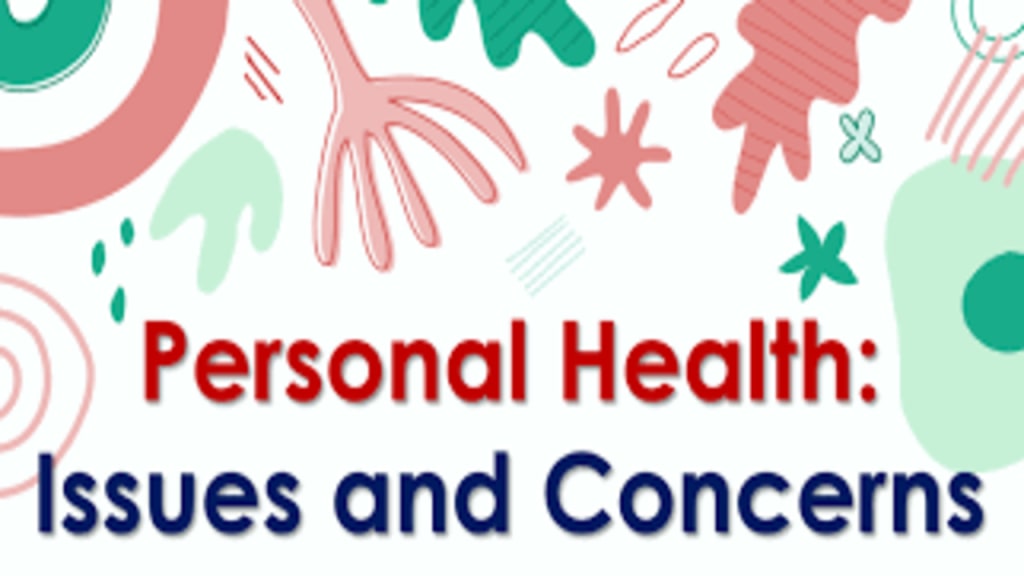Personal Health Issues
Taking Charge of Your Well-being

Personal health issues have a profound impact on our daily lives and overall well-being. Whether it's a minor ailment or a chronic condition, addressing and managing these issues is crucial for leading a healthy and fulfilling life. In this article, we will explore the significance of personal health issues, common challenges individuals face, and strategies for taking charge of one's well-being.
Understanding Personal Health Issues
Personal health issues refer to physical, mental, or emotional conditions that affect an individual's well-being. These issues can vary widely, ranging from common ailments like the flu or allergies to more complex conditions such as diabetes, anxiety, or depression. Personal health issues not only affect our physical health but also impact our mental and emotional states, relationships, work productivity, and overall quality of life.
Challenges in Addressing Personal Health Issues
Addressing personal health issues can be challenging due to various factors. Here are some common challenges individuals face:
1. Lack of awareness: Many people may not be fully aware of the symptoms, causes, or available treatment options for their health issues. This can delay diagnosis and appropriate intervention.
2. Stigma and societal perceptions: Mental health issues, in particular, are often stigmatized, leading individuals to hesitate in seeking help or openly discussing their challenges.
3. Financial constraints: Healthcare costs can be a significant barrier for individuals in accessing necessary treatments, medications, or consultations with healthcare professionals.
4. Limited access to healthcare: In some regions or communities, there may be limited healthcare resources, including a shortage of medical professionals or specialized services.
Taking Charge of Your Well-being
While personal health issues can be daunting, there are strategies individuals can employ to take charge of their well-being and manage their health effectively:
1. Education and awareness: Take the initiative to educate yourself about your specific health issue. Research reputable sources, consult healthcare professionals, and seek support from patient advocacy groups. Understanding your condition and its management options empowers you to make informed decisions about your health.
2. Seek professional help: If you are experiencing personal health issues, it is essential to consult with healthcare professionals. General practitioners, specialists, therapists, or counselors can provide expert guidance, accurate diagnosis, and appropriate treatment plans tailored to your specific needs.
3. Establish a support network: Surround yourself with a supportive network of family, friends, and peers who can provide emotional support and understanding. Joining support groups or online communities specific to your health issue can also offer valuable insights and a sense of belonging.
4. Practice self-care: Prioritize self-care activities that promote physical, mental, and emotional well-being. This may include regular exercise, sufficient sleep, a balanced diet, stress management techniques (such as meditation or deep breathing exercises), and engaging in activities you enjoy.
5. Advocate for yourself: Be an active participant in your healthcare journey. Ask questions, express concerns, and discuss treatment options with your healthcare provider. Effective communication and collaboration with your healthcare team ensure that your needs are addressed and your treatment plan is tailored to your preferences and goals.
6. Manage stress: Chronic health issues can lead to increased stress levels. Engage in stress-reducing practices such as mindfulness, yoga, or hobbies that promote relaxation. Learning effective stress management techniques can help improve your overall well-being and resilience.
7. Adopt a healthy lifestyle: Make positive changes to your lifestyle that support your health. This includes maintaining a balanced diet, engaging in regular physical activity, avoiding harmful habits such as smoking or excessive alcohol consumption, and practicing good hygiene.
8. Stay proactive: Regularly monitor your health and attend scheduled medical check-ups or screenings. Early detection and intervention can significantly improve outcomes for many health conditions.
Conclusion
Personal health issues can have a profound impact on our lives, but with proactive management and support, individuals can take charge of their well-being. By educating ourselves, seeking professional help, establishing a support network, practicing self-care, advocating for our needs, managing stress, adopting a healthy lifestyle, and staying proactive, we can effectively navigate personal health issues and improve our overall quality of life. Remember, you are not alone in your health journey, and there are resources and support available to help you thrive.
About the Creator
imran khalil
In a world where words shape our perceptions, ignite our imaginations, and connect us across time and space, article writers play a crucial role in delivering informative and engaging content. Among these skilled communicators,





Comments
There are no comments for this story
Be the first to respond and start the conversation.